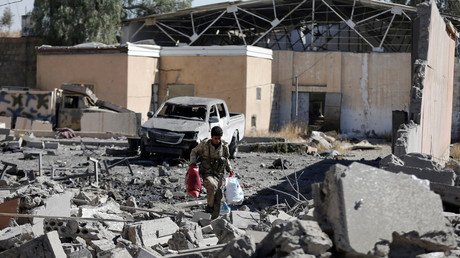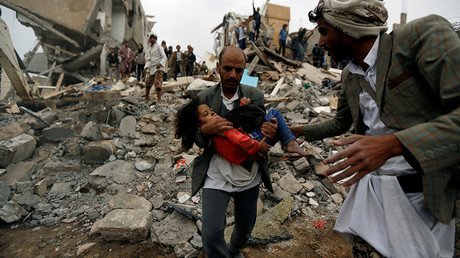Yemen crisis: ‘Unacceptable that people die from totally preventable reasons’
The world needs to respond to the urgent humanitarian situation in Yemen, otherwise millions won‘t be able to provide the basic necessities of a decent life for their families, said Ralph El Hage, ICRC regional spokesperson.
At least 25 people were reportedly killed by a Saudi coalition airstrike at a busy market in the southwestern province of Taiz in Yemen. Dozens more civilians were wounded in the bombing raid on Tuesday. Many of the victims are children.
Saudi Arabia launched its intervention in Yemen in March 2015 to support the government against Shia Houthi rebels. The campaign has claimed thousands of lives.
Daoud Khairallah, Professor of international law at Georgetown University, says that as incidents like the Tuesday market bombing have become tragically familiar, the international community – and particularly the UN Security Council - should appoint a committee to carry out an investigation into what he described as “crimes against humanity.” In his comment to RT, he criticized the body for the lack of action.
“Washington should be more concerned, and it bears more responsibility than other countries. Why? Because it is so close to Saudi Arabia; it is the source of weapons used in Yemen; and because it can do much more. And it doesn’t,” Khairallah added. “The other party that I really would blame is the international media and particularly the American media. They don’t do what is necessary, bringing to the attention of the public, in general, the scope of these atrocities, to put an end to them; to put some pressure on responsible people.”
Meanwhile, the humanitarian situation in Yemen is extremely worrying and may deteriorate even further if no urgent measures are taken, says Ralph El Hage, ICRC Public Relations for the Near and Middle East.
Shocking: 1 million suspected #cholera cases in #Yemenpic.twitter.com/0lCMRsxps1
— ICRC Yemen (@ICRC_ye) December 21, 2017
Ralph El Hage: The humanitarian situation in Yemen is extremely worrying, despite the fact that some humanitarian aid was able to reach through the port city of Hodeidah. More particularly the ICRC [International Committee of the Red Cross] managed to bring in much-needed fuel through the port city of Hodeidah. However, that is not enough.
1 million suspected #cholera cases in #Yemen reached pic.twitter.com/CzGgbg96YW
— Ralph El Hage (@RalphICRC) December 21, 2017
Today we’re talking about a country where almost 18 million people need some sort of humanitarian aid – be it medical aid, access to food, access to proper clean water. This is a situation right now. Unfortunately, food and medicine prices have really increased to an unattainable extent, where people are unable to buy their basic necessities. This was primarily due to the blockade that was imposed on the country.
However, today what remains is that we need access to more humanitarian aid; we need more access through the port of Hodeidah. Also, we need the airport in Sana’a to be open so that we are able to bring in further humanitarian aid through different ports into the country. Without these ports fully functional the situation will continue to deteriorate. When it comes to cholera, we’ve seen that almost a million people are suspected to be sick with cholera today in Yemen. However, that is not the only issue when it comes to health cases. Today we’re seeing other types of diseases that are spreading. Again and again, it is because medicine and medical supplies are in really in scarce quantities in Sana’a, Taiz, Aden and all major cities and governorates in the country.
5000 children have been killed or injured in the last 1000 days in #Yemen. But it's the long-term impact of the conflict that is more scary. A child died every 10 mins from preventable diseases as the health system collapses. This young girl cheated death, her friends couldn't. https://t.co/oGZfGCBBYn
— rajatmadhok (@RajatMadhok) December 22, 2017
RT: The UN has warned the situation in Yemen can result in the worst famine the world has seen. How can you comment on such a warning?
REH: The term famine is really a big term to use. What we see today is that more and more people are unable to access basic food necessities. The prices are increasing, which makes it even harder for them to purchase their necessary nutritional needs. Historically, we know that Yemen was and remains the poorest country in the Middle East. Even before this war wreaked havoc on the infrastructure and the people of Yemen, the Yemeni people were really suffering due to high levels of poverty. Now the war continues unabated with no end in sight. We only see that the humanitarian situation continues to deteriorate on all levels in Yemen. Today if we look at the Middle East, Yemen is the most urgent humanitarian catastrophe, or humanitarian situation that the world needs to highlight, the world needs to respond to as soon as possible, otherwise thousands, maybe millions more will need humanitarian aid, and will be unable to provide for the children, for the families, the basic necessities of a decent dignified life.
'Devastating’: #Yemen’s cholera endemic hits 1mn mark https://t.co/4aLBdTVSGdpic.twitter.com/jGgs6HT6Ec
— RT (@RT_com) December 21, 2017
RT: Yemen is importing some 90 percent of food, and now over seven million people in the country are at acute risk of famine. How bad can the situation become given the ongoing blockade?
REH: As the result of the situation today in Yemen, the numbers are really sad and scary. We have [around] 20 people – men, women, and children, who lose their lives on a daily basis in Yemen, because they are unable to purchase their needed medicine, or because they are unable to provide the proper health care that they need to cure or to treat totally treatable diseases or medical cases. This is unacceptable for people to die of totally preventable reasons. If the situation continues as it is now, we will see more and more people unfortunately lose their lives.
I have seen it myself, when I was in Hodeidah and in Sana’a, children who are unable to receive the proper medical care, because government employees that work in hospitals are unable to be paid, there are no salaries, so they are unable to work, because the parents of these children are unable to pay for the needed medical examinations, or proper diagnoses for their cases, and … these children die…














